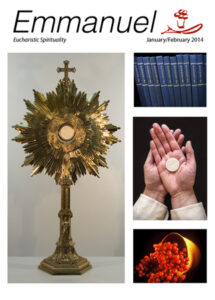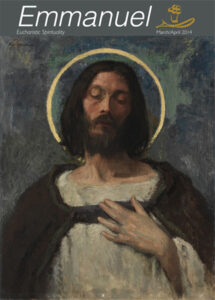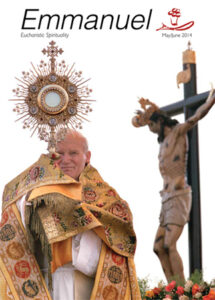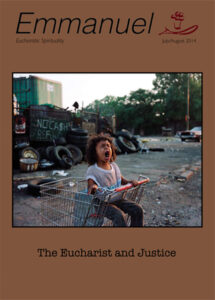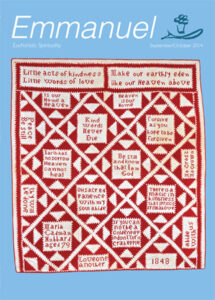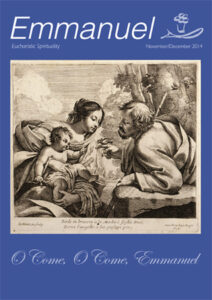Emmanuel Magazine Archives
2014
On the horizon, however, stands another man who is being hailed as a transformational leader: Pope Francis. The former Jesuit priest and Argentine archbishop has surprised everyone with his candor, his unpretentious style, and his impassioned articulation of a “church of the poor.”
In striving for the transformation of the church, a pope has distinct advantages over a President. He doesn’t have to deal with the checks and balances found in a representative democracy or contend with independent branches of government. Additionally, his words carry the weight of office as universal pastor and teacher.
This issue of Emmanuel devotes several articles and reflections to the Holy Father and his vision of the church. As a magazine of eucharistic spirituality, our purpose in presenting these is to explore the ecclesial and eucharistic dimensions of his words and actions, and especially the spirituality underlining them.
The great penitential season of Lent starts on March 5, Ash Wednesday. The Directory on Popular Piety and the Liturgy states: “Lent precedes and prepares for Easter. It is a time to hear the word of God, to convert, to prepare for and remember baptism, to be reconciled with God and one’s neighbor, and of more frequent recourse to the ‘arms of Christian penance’: prayer, fasting, and good works.”
From its origins, of course, Lent has been about the preparation of candidates for initiation into the Christian life through baptism, confirmation, and Eucharist. But Lent is also about the renewal of the already-initiated, about “getting fit spiritually,” through more dynamic discipleship living.
In Preface I of Lent, we pray: “For by your gracious gift each year, your faithful await the sacred paschal feasts with the joy of minds made pure, so that, more eagerly intent on prayer and on the works of charity, and participating in the mysteries by which they have been reborn, they may be led to the fullness of grace that you bestow on your sons and daughters.”
Let’s “get fit” (spiritually) this Lent!
On Sunday, April 27, two popes of the twentieth century, John XXIII and John Paul II, were declared saints at Saint Peter’s Basilica. The former is affectionately called “Good Pope John”; to the latter is applied the rarest of titles, “the Great.” “Their lives,” Cardinal Angelo Amato says, “completely dedicated to proclaiming the Gospel, shine in the church and reverberate in the history of the world as examples of hope and light.” Heaven knows, our world needs hope and light!
God gives each of us every necessary means to grow in holiness, especially the Eucharist. When we celebrate the eucharistic mystery in faith and receive the Lord’s gift of love in joy and openness of heart, we are transformed and grow more and more to resemble Christ.
Saints John XXIII and John Paul II were deeply devoted to the Eucharist, both in their personal spirituality and in their public ministry. They believed in its power and in its necessity for anyone seriously committed to living a life of Christ-like goodness and holiness.
I invite you to read Father Paul Bernier’s moving reflection on the Eucharist in the life and teachings of Pope John XXIII as well as an accompanying piece on Pope John Paul II. This issue also contains a meditation on Mary, the first disciple and the mother of compassion.
This issue of Emmanuel, continuing a longstanding tradition of a summer social justice focus, offers reflections on “concurrent themes” in the eucharistic thought of Father Pedro Arrupe and Pope Francis and on social responsibility as an extension of the solidarity experienced around God’s Table. There is Father Dennis Billy’s incisive analysis of the Scripture-based morality of Father Bernard Häring; and lastly, the moving story of how one parish reaches out in friendship to people living on the streets of a large American city.
The parable of the shepherd who goes in search of the lost sheep (Mt 18:12- 14; Lk 15:4-7) speaks to the tender care of the shepherd for the most fragile and frail among the flock. The Good Shepherd of the pope’s pectoral cross
holds a sheep around his neck, gently supporting its legs with his hands.
Pope Francis reminds us that “we have to become courageous Christians and seek out those who are the flesh of Christ.” Last October, he said: “Every day we are all called to become a ‘caress of God’ for those who perhaps have forgotten their first caresses, or perhaps who never have felt a caress in their life.” And he has repeatedly called Jesus the “man for others.”
It isn’t difficult to identify the lost sheep of our age: the poor, the disfigured, the sick, the homeless, refugees, the unchurched, those struggling with belief, the young, and the elderly. Do we have the courage and the will to be the “caress of God” for them?
The celebration of the Eucharist incorporates many elements, we are told in Chapter II of the General Instruction of the Roman Missal, among which are the spoken and sung word, sacred gestures, and periods of silence. All of these “contribute to making the entire celebration resplendent with beauty and noble simplicity, so that the true and full meaning of the different parts of the celebration is evident and that the participation of all is fostered” (42).
These same elements (word, gesture, and silence) constitute, I believe, the heart of the mystery of the incarnation which is central to Advent- Christmas.
Silence serves a vital purpose in liturgy and in life, allowing the word to be received and to resonate in the depths of our being, and creating space for the meaning and power of gestures to be grasped.
Amid the busyness of holiday preparations and ministerial demands, it can be difficult to create an atmosphere of silence and peace within. But it is necessary, for grace enters our world and our lives in silence and in
emptiness.
We stand before mystery in this Advent-Christmas season: the mystery of the Word made flesh for the salvation of the world. We welcome Christ, the living Word, as Mary did long ago.




